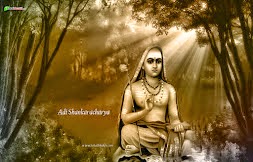Swami Adi Sankaracharya's Philosophy of Life : 1.
Man does not live by bread alone; he lives by the Spirit within. Spiritual hunger continues even if this physical body is cast off. Unless this innate hunger for knowledge and perfection is appeased, one cannot hope to have any rest. The saints, sages and Avataras purvey to man, now and then, the required spiritual food. Sankara is one such great feeder of mankind. It was Sankara who finally and satisfactorily answered the perplexing questions of life – questions concerning the inward, the outward, the above, and their mutual relations, questions which embrace the entire existence itself in their scope. There is the seer, the seen and also something which cannot be either the seer or the seen, as corroborated by a necessity felt for a reality which must be other than the individual who is the seer and the world which is the seen, both of which are known to be appearances due to their inherent character of changing, passing away, and giving rise to something else.
Man exists, and he feels that he exists; he has a direct apprehension of his existence. But he also knows that he is not a permanent being; that death spares no man; that all men, animals and plants have an end. Man also knows that the world which he is in and which presents itself before him as an object of his knowledge, too, is subject to destruction and, therefore, not ultimately real. What, then, is real? If man shall die one day, if all living beings shall pass away, and if the whole world, even the galaxy of solar systems, shall not last, what is it that shall last? Though it is true that everything that is seen perishes, is it also true that there is nothing imperishable? Acharya Shankara, the genius, comes forward and lifts the reason of man above by freeing it from the trammels of empirical vision when he boldly declares that if everything is impermanent, something should be permanent; if all shall come to a limit or end some time or other, there must be something which does not have limit or end at any time. If the whole world is transient, God must exist, and He alone can be eternal.
Swami Sankaracharya was not a dogmatist or a mere authoritarian but a very clear-headed and highly intelligent logical thinker. He established the reality of the existence of God, not simply on the ground of scripture or tradition, but on the unshakable basis of immediate perception and deduction therefrom. It is Sankara's firm conviction that nothing can be said to be transitory unless something is enduring, that no appearance is possible without a reality underlying it. The fact of the death of the individual, the changing nature of thought, and the fleeting behaviour of the world is enough to posit the existence of a great Reality which does not vanish with the individual or perish with the world. This Supreme Being is God, and to know Him is to know the truth of all things in all forms in time as well as in space.
Continues...



.jpg)

Comments
Post a Comment